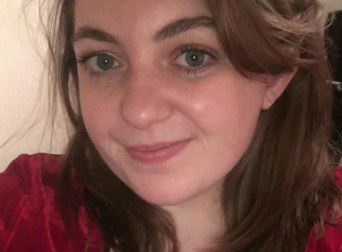Sign up for updates
Interested in studying at the University of Hertfordshire and want to sign up to our mailing list to learn more about our facilities, living in the UK and student life? Use the form below and our team will also keep you informed of key updates such as events near you, applications opening and more!
BA (Hons) History with Film
Key information
-
Typical offer:
Entry requirements -
Fees: See below
Full details -
UCAS code: V1W6
-
Institute code: H36
-
Study abroad option
-
Work placement option
Find out more
Why choose this course?
- Join our award-winning Oral History Team (featured on BBC R4)
- Focus on your interests - All History modules optional after 1st year
- Close to the Warner Bros. and Harry Potter studios
We give you:
- An exceptional History team, conducting world-leading research (REF 2014)
- Stimulating, innovative courses - our History students reported almost 94% overall satisfaction with their course (2018 National Student Survey)
- A flexible programme of study, allowing you to concentrate on areas you find especially interesting
- The scope to write a History dissertation on a topic about which you are passionate, potential blending your interests in film and history
- A mixture of intellectual and practical skills.
- An expert film team with in-depth knowledge of the film industry plus the opportunity to get involved with local cinemas and our own bespoke film club.
- CV-building potential and practical experience through work placements and extra-curricular activities. Previous students in this department have had year long paid placements at Warner Brothers in London, Hatfield House and local museums.
- History was ranked in the top 25% of UK universities for research impact. (Research Excellence Framework, 2021).
What's the course about?
Study with a top History department and be taught from the cutting edge of historical research. Further your skills with a unique film course which combines the study of film as an art form with learning the practical skills of film making.
Through our diverse and inclusive History curriculum you will learn about an array of cultures and identities. What links our work is our focus on people’s history and everyday lives. This is represented strongly in our first year programme, which will give you an insight into the making of the modern world through exploration of faith, magic and medicine, campaigns for freedom and equality, Africa and the world, and America from Hamilton to Trump.
Our expert colleagues in Film take a similar international approach. You will explore the fascinating world of Hollywood, World Cinema, European Cinema as well as the film industry in Britain, so you have insider knowledge of what makes a successful film and appreciate diverse genres, contexts, cultures and filmmaking techniques.
Throughout your degree, the common link between the two disciplines will be the development of analytical skills. As historians you will learn to analyse historical documents and debates among historians, while in Film you’ll develop the ability to analyse visual material, understand the craft of film making and gain new perspectives on the world.
Work placement/study abroad option: Between your second and final year, you’ll have the option to study abroad or do a work placement for up to a year. Not only will this give you an amazing experience to talk about but will also give your CV a boost. If you’d rather go straight to your final year, that’s absolutely fine too.
These analytical skills, honed over the course of your studies, will benefit you in the final year of History if you choose to write a dissertation. This extended piece of work will grow out of a topic that interests you. Previous students have combined their Film and History studies to explore issues of propaganda or the depiction of historical events in film.
Your main campus is College Lane
This is where the creative arts, science and health-related subjects are based. This means you’ll share the campus with future nurses, scientists, artists and more. You can use the common rooms to relax with friends, work out in the 24-hour gym or have a drink in our on-campus pub or cafes. We also have restaurants for you to eat in or grab something on the go. Our Learning Resources Centres are open 24/7, which means you can study whenever suits you best. Want to pop over to the other campus? You can take the free shuttle bus or walk there in just 15 minutes.
What will I study?
Our interactive seminars and workshops in History and Film help you find your feet in the academic environment, and establish ways of working confidently, creatively and collaboratively. We see our students as fellow researchers, and we place a great deal of importance on sharing and developing skills.
Our History and Film students benefit from being part of a diverse and active academic community. The Media Matters Guest Lecture series, which is free and open to students, might appeal to film students. Previous speakers include Jessica Fellowes, journalist and author of companion books to the Downton Abbey television series as well as video producers for household name clients such as Waitrose. As one of our students, you also have the opportunity to get involved in activities that will complement your studies. Not only do these enhance your experience, they also make for a more impressive CV. Our renowned staff-student Oral History team has taken students to Australia and produced a BBC Radio 4 documentary, which was commended at the 2018 Royal Historical Society Public History Awards. Film students get the benefit of their own film club.
Check out our student blogs

Student Blogs
Jasmine - Week at a glance
My week at a glance
History lessons are taught between a mixture of lectures and seminars for the first two years (Level four and five). A typical week would consist of one-hour lectures per module followed by a seminar, which could either be immediately after or on a different day. The seminars consist of smaller groups of people where you discuss both the lecture’s information and the assigned reading. These can be debates, presentations, or simple discussions. So, despite only having contact time for four hours per week, there are independent reading and assignments which need to be completed.
I start my week by completing the required reading, making notes of anything I do not understand so that I can ask my lecturer. After completing the weekly reading, I will work on the assignments. Even though they are mostly due at the end of the semester it is a good idea to work on them throughout, so you do not leave them until last minute.
I participated in active students, which is free for all Hertfordshire students. Here I would attend yoga classes, but there is a wide range of fitness and wellbeing events that take place. I also enjoyed badminton, as you could either go alone or with a group of friends. It is also a good idea to join society as it not only boosts your CV, but it is a way to meet likeminded people and develop friendships.
I also had a part-time job which I would do alongside studying. This means that planning is vital as you want to be on top of your workload to ensure you have enough time to complete it to the best of your ability. It worked well with the history course as most of the work was independent, meaning I could work around my other commitments.
It is important that you allow downtime alongside work as it recharges you and you can produce better quality work. It also prevents you from being overworked and ensures that you enjoy the course.

Student Blogs
Jasmine - Things you should know
Things you need to know before studying History at Herts
Preparation is key! Once you know what modules you are taking it is useful to do some research prior so that you can enter the module with basic knowledge. This makes studying it that much easier and you are less likely to be left behind. It prevents your workload from building up and be unbearable. History is a very independent course and will consist of quite a bit of reading, so you need to organise your time efficiently. Leave enough time to work on your assignments from the start so that if you have any issues you can get them sorted in time.
Complete the required reading as that way you will be able to contribute to the seminar discussions. Furthermore, if you stumble across words you are not familiar with or useful words it’s a good idea to make a keyword list and ask your lecturer if you are unsure of a specific concept. When completing the reading highlight important themes and produce short notes. Put them in your own words and as simple as possible, as it makes them easier to understand in the future. It is usually best to find a spot away from distractions and turn your phone off. Moreover, take regular short breaks, to allow what you have read to sink in.
Do not be afraid to talk to the lecturers, they are lovely and always willing to answer questions, especially on assignments. I found that discussing my drafts with lecturers before completing them allowed me to get high grades as they were able to point me in the right direction. They are there for you, so make sure you use them as much as possible.
Most importantly make sure you are having fun and enjoy yourself. Allow downtime so that you can recover and have the right amount of work/life balance.

Student Blogs
Jasmine - Why I love History
What I love most about my course
I loved that with history you could do as much or little as you wanted. Alongside completing the required tasks, lecturers indicated further reading sources if you wanted to. That meant to if there was a part of the subject that interested you, it was possible for you to explore it further. Moreover, most of my lecturers would ask at the start of the semester what we wanted to get from the course. This meant if there were specific areas that we were most fascinated with or wanted to learn, they aimed to include that into the module.
I also loved that there is a range of topics that are covered, and the ability to choose which ones you wanted. I minored in public history which meant that instead of the typical essay assignments I created a documentary for one module. Another module was work experience, so I got to volunteer. We also went on trips to the archives and Bayfordbury campus which offered alternative styles of learning and experiencing history outside the classroom. This was exciting as I got to try new things, which I would not have thought to do.
The humanities department was extremely inclusive. They have an Instagram and post regular events like rollerblading and film nights which allowed you to socialise with your lecturers and peers. The staff were all friendly and welcoming and always happy to help with any issues. I felt that they truly wanted me to succeed, and they had my back. The events helped to create a work/live balance.
Due to the independent nature of studying history, I was able to adapt to studying around my lifestyle. Because the contact time was only eight hours per week, I was able to work alongside studying. I was also able to study on the train journey or at home when I returned to visit family, meaning that I was not left behind on my workload.

Alumni Stories
Callaghan French
Meet Callaghan. Callaghan’s love of history inspired him to study at Herts and now he is teaching in Italy.
Read more stories BA (Hons) History| Current job role | English as a Second Language Teacher in Italy |
|---|---|
| Year of graduation | 2022 |
| Course of study | BA (Hons) History |

A love of history
Callaghan’s love of history started in primary school, and it stuck with him up until it was time to apply to university. He visited Herts for an open day and was impressed. He says, ‘Herts offers the opportunity to study a wide range of historical topics, they have a huge library, and extensive resources available to students. I also had a compulsory academic support module in the first year which was very helpful for my studies.’
His time at Herts was impacted by the COVID-19 pandemic, but one of Callaghan’s favourite moments was when he and fellow committee members were able to revive the History Society once restrictions were lifted. He says, ‘Working together to achieve this after such a tough period is an experience I will always value. I’d recommend that everyone join a society!’
Callaghan says that the most interesting part of his degree was his dissertation because he had the opportunity to research a topic of his choosing and present it to his lecturers and course mates.
Teaching in Italy
Callaghan is now a Teacher in Italy, where he teaches English as a Second Language. He says, ‘My course shaped me into a strong and confident speaker, which has greatly helped me in my current role. I was able to practice this skill in seminars and the occasional presentation.’
Callaghan is considering a career in academia or the Civil Service. His advice to current or future Herts students is to, ‘Work hard, but ask for help if you need it.’

Alumni Stories
April Wilson
Meet April Wilson, who used the diversity of her course to gain new experiences and learn. She is currently an Alumni Relations Coordinator at the University of Sussex.
Read more stories BA (Hons) English Literature with Film| Current job role | Alumni Relations Coordinator |
|---|---|
| Year of graduation | 2017 |
| Course of study | BA(Hons) English Literature with Film |
| MA Journalism with Media Communications |
University life and experience
April initially decided to go to the University of Hertfordshire due to our close proximity to London. She liked that it was easy to commute into the city for shopping and concerts, but that Hatfield wasn’t as expensive to live in!
While studying, April gained valuable experience which helped her develop essential skills for her current role which meant she was able to start ‘armed with the knowledge’ she needed.
However, the most useful thing she learnt from her postgraduate course was having confidence in herself and her ideas, especially when presenting. She credits this to ‘the support of my peers and lecturers who made me feel more confident in my abilities.'
She adds that her undergraduate degree helped her develop the writing and research skills which she applies daily to her current role and her approach to work.
Not only did April gain experience from her studies, but the extra-curricular activities she took part in also helped develop her skills. She says, ‘The writing and video editing experience I was able to gain from my time volunteering for societies at the University was also essential in helping me to have the skills that are valuable within my role.’
Future aspirations
April is also willing to try new experiences to help her gain valuable work experience in a variety of roles. She has previously, done everything from fundraising for charity to running my own online magazine.
In the future, April hopes to continues her studies and complete a PhD in Film Studies. She is particularly interested in looking at representation in films and how this is interpreted through social media.

